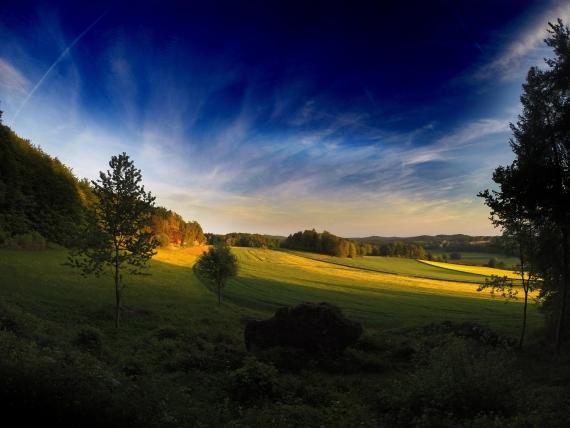Residential Land - What Is It and How to Use It

Last updated: April 2018
If you're new to land investing, you may see a lot of people talking about residential land. What exactly does residential mean? And how does this term affect land usage? It's important to understand exactly what you're getting into before you sign on the dotted line.
What is Residential Land?
Simply put, residential land is residential property meaning that it will be used by families and individuals for private housing. Both single-family and multifamily homes can be built on residential land. This includes apartments and condominiums. Residential is a type of zoning, and its requirements/uses differ greatly from properties zoned as commercial, industrial or agricultural.
In real estate development, residential areas are often used to build subdivisions. The land is divided into several different lots, and homes are built on each lot. If you plan on building your dream home, building and renting a house, or developing an apartment complex, residential land is what you should be looking for.
How Can You Use Residential Land?
You know what residential land is, but how can you use it? Naturally, you can use this type of land to build a home or multi-family dwelling. But you can also use it for other purposes as well. And there are some things that you are not permitted to do, too.
When searching for residential lots, location is the most important thing. No matter whether you plan on building your dream home or making an investment, the property you purchase should be in a great location.
If you plan on developing the land for investment purposes (such as a rental property), then you’ll need to consider other things as well, including:
- Proximity to the town’s amenities. Is the property located near schools, shopping and the town’s major employers? If not, you may have a harder time renting the property.
- Quality of schools. You’ll have an easier time finding tenants or buyers if the local schools are good.
- Accessibility. Is the property easily accessible from the road? Properties that are not easily accessible may be more difficult (and costly) to develop. You may also have a harder time finding buyers or tenants if they cant get to your property easily.
Residential Land Restrictions
Zoning laws for residential areas may vary from one city or state to another, but there are a few basic restrictions that you'll find in most areas. For one thing, most areas will restrict the type of animals that you keep on your residential property. Domestic pets, like cats, dogs and birds, are fine. But there will likely be certain requirements that you'll need to meet if you want to keep horses, sheep, chickens, cows or pigs. Most cities have ordinances in place to keep farm animals out of residential neighborhoods. Some cities will permit these animals on residential land, but there will be size requirements. For example, many areas require one acre per horse.
Other restrictions may include:
* The overall size and height of the building. * The area of the lot where the structure can be built. * How close buildings can be to one another. * The types of facilities you can house on your land, and their uses. * Minimum lot size.
There may also be utility, lot size and street requirements that must be met if youre building in a subdivision.
Home Business Restrictions
One thing that potential land buyers often overlook is the fact that there may be certain regulations in place that prevent you from running your home business from your property. Most cities will allow you to run a small business from your home, provided its not disruptive or polluting. Get a copy of the local ordinance to learn more about this restriction. The ordinance will provide you with a list of approved occupations. If the ordinance says that you cannot run your business from your home, you can always appeal the decision to the County Board of Supervisors or City Council.
Permitted Residential Land Uses
Permitted uses for residential land will vary from one location to the next, but all areas will permit the building of either single-family or multifamily dwellings. There may be restrictions on the type of structure you build, its size, height and appearance, but all residential zones will allow for the building of some sort of private residence.
This may include:
* A single family home * A multifamily home * Condominiums * Apartment complexes * Duplexes * Townhomes
Generally, there are three different types of residential properties, and the type of property you choose will determine what you can do with it.
Low Density Residential
Properties in Low Density Residential areas will allow a single traditional single-family home to be built on the property. These areas typically consist of lots with single-family, detached homes with private yards. There may be restrictions on how many dwellings can be built per acre, and this restriction will likely be dependent on the towns population density. Other permitted uses in this category may include educational and religious institutions, community care facilities, and group homes.
Medium Density Residential
Properties that fall under the Medium Density Residential category allow for moderate density housing through attached or detached homes. Again, the city will have requirements on how many units can be built per acre. In some cases, housing may include common open and private space.
High Density Residential
In High Density Residential areas, a wide range of different dwelling types can be built there either detached or attached. In most cases, properties in these areas consist of condominiums, apartments and townhomes. There will be a limit on the maximum density of units that can be built per acre, and additional permitted uses may include educational facilities, religious institutions and group homes.
Costs
When you purchase vacant land, you need to consider more than just the cost of the land itself. Development costs must also be taken into consideration. Most buyers underestimate costs, which can result in the delaying of development or a complete halt on the project.
Here are just a few of the many costs you will need to add into your budget:
• A survey, if necessary.
• Permits and fees. The number of permits you will need and the fees to obtain them will depend on your location and the property itself. Ask for a complete list of all permits you will need along with their fees.
• Landscaping.
• Septic system installation, if applicable.
- Utility hookups, including electric, phone, gas, cable, water and sewer. In some cases, these lines are already in place. If not, you will need to pay the cost of running them.
• Paving.
• Earthwork, including blasting, excavation and cut-and-fill.
• Legal costs, including closing and title search costs. Other legal costs may including right-of-way problems, variance requests, abutter challenges, boundaries issues, etc.
• Impact fees. Many towns now assess these fees as a way to help pay for schools and other public costs associated with new home development. These fees go by many names, including mitigation fees, development fees, facility fees or service availability charges. Rarely are these fees under $1,000. In some areas, these fees can be $20,000 or more and are used to discourage development.
The Bottom Line
Residential land is exactly what it sounds like: land designated for private residences. Commercial and industrial activities are not permitted, and in many cases, there are restrictions on the type of animals you can keep on the property. This means that if you were hoping to buy a piece of land for farming and livestock, you must check local ordinances to see if these uses are permitted on residential land. If not, you'll need to look for agricultural land, or land in a zoning area that would permit this use.
If you're simply building a home, either for personal or income purposes, residential property is exactly what you need. You may still face restrictions as to how high or large your home can be and even where its situated on the property, but generally, if you intend on building a home or multi-family unit, residential is the type of land you want to buy.
If you're unsure of what uses are permitted on residential land in your area, consult with your local planning and zoning department, or speak with a real estate lawyer. The planning board will likely be more helpful, as they have a full understanding of the ordinances and regulations in place.




